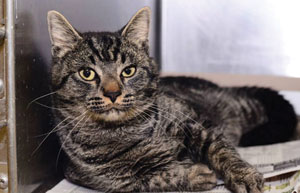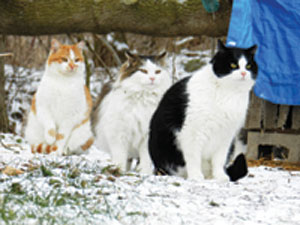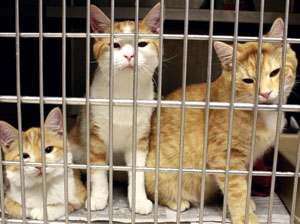In October a group of Alley Cat Allies staff members visited the Kanawha/Charleston Humane Association in West Virginia at the invitation of its new shelter director, Chelsea Staley. Chelsea was justifiably excited: She’d been appointed interim director of a shelter in crisis where “euthanizing” was the norm, but she was turning things around. She’d heard that Alley Cat Allies wanted to partner with shelters committed to adopting lifesaving solutions for cats, and couldn’t wait to show us that she and her team meant business.
We didn’t take much convincing. A drastic reduction in “euthanasia” rates, significant changes in shelter operations, and a well-attended community Trap-Neuter-Return (TNR) training that showed strong public support pointed toward a promising partnership. Kanawha/Charleston Humane Association became the first shelter chosen for our new grant program called the Future Five: Shelter Partners to Save Cats’ Lives.
The selected shelters have all committed to an official Feral Cat Protection Policy, which means that they will stop impounding and killing feral cats and support TNR, a humane program for outdoor cats. When shelters stop the cycle of impounding and killing healthy feral cats, a paradigm shift occurs. They receive community buy-in, cats are protected, and their resources are redirected to support effective lifesaving programs.
Kanawha/Charleston was a logical fit for our grant program. “In just a few short months, Chelsea has started the process to transform the shelter to a compassionate halfway house for animals,” says Juliana deRosa, Senior Manager of Community Engagement for Alley Cat Allies. “In fact, no feral cats have been euthanized since the inception of their Shelter-Neuter-Return program.” As in TNR programs, cats in Shelter-Neuter-Return (SNR) programs are vaccinated, sterilized, and returned to the location where they were found; the only difference is the brief stop at the shelter.
Each of the shelters chosen for the Future Five: Shelter Partners to Save Cats’ Lives is receiving an award of $5,000 and one year of expert guidance and resources from Alley Cat Allies. Our donor support makes this possible.
“We are deeply honored to be selected,” says Chelsea, who became director on Oct. 31 following an interim role. “In past years, this shelterlike many others across the countrykilled most of the cats who came through its doors. My goal as the new shelter director is to move us toward a model that will include a self-sustaining Shelter-Neuter-Return program for cats. I look forward to partnering with Alley Cat Allies as we work toward that goal.”

The Kanawha/Charleston Humane Association has implemented a new adoption system and also features adoptable animals like Harry on its Facebook page.
The number one documented cause of death of cats in this country is animal pounds and shelters. More than 70% of all catsand virtually 100% of feral catswho enter shelters are killed. Transforming shelters to be lifesaving resources in communities is Alley Cat Allies’ main mission. We are glad to report there has been progress over the past two decades as 350 municipalities nationwide have embraced TNR. Cats who undergo TNR are humanely trapped; transported to a veterinary clinic where they are spayed or neutered, vaccinated, and eartipped; and then returned to their original colony homes. Reproduction stops immediately, and the colony size stabilizes and decreases through natural attrition.
The five shelters chosenfrom an applicant pool of large, small, rural, urban, private, and municipal sheltersreflect a cross section of sheltering in our country. Each is receiving customized advice and solutions that reflect their unique obstacles. Along the way we’ll be documenting every step of their journeys so we can provide case studies at the end of the year for other shelters to follow.
Joining Kanawha/Charleston Humane Association in the Future Five: Shelter Partners to Save Cats’ Lives program are the following shelters whose strong leaders recognize they have a responsibility to serve their community with humane policies for cats:
- Bay Minette City Shelter, Bay Minette, Alabama: In 2009, the City of Bay Minette rewrote its animal control ordinance to include a Feral Cat Initiative program at the insistence of Gina Jones, an animal control/cruelty investigator. She campaigned for a citywide TNR program, citing how ineffective the systematic killing of feral cats had been to date, and the evidence to support TNR. Despite having city code and community support, there is limited to no funding available to perform the crucial surgeries and vaccinations.
- Johnson County Animal Shelter, Franklin, Indiana: Johnson County recently revised its ordinance to support TNR practices and protect the community’s cats and the people who care for them. The Johnson County Animal Shelter is uniquely positioned, working in close partnership with the Humane Society of Johnson County, to provide hands-on support and education that could save countless cats’ lives throughout the county. All funding received will be used to purchase additional humane traps, fund surgeries and vaccinations for community cats, and develop and expand educational materials and programs available to the community.
- Lee County Domestic Animal Services, Fort Myers, Florida: The shelter has been helping feral cats since implementing a TNR program in March 2009 called Operation S.O.S. (Spay Our Strays). They have a proven record of commitment to saving cats’ lives and creating positive community-wide change and need Alley Cat Allies’ support to have an even greater impact.
- Stanislaus Animal Services Agency, Modesto, California: The Stanislaus Animal Services Agency wants to save healthy cats. In partnership with the Humane Society of Stanislaus County, they adopted a new project in June, though which community members are encouraged to help humanely trap community cats and bring them to the shelter where they will be evaluated for health issues and socialization/adoption. If healthy, the cats will be spayed/neutered and vaccinated, eartipped, and returned to their community. The agency hopes to be a mentor to other communities in the area and across the
country.
Changing an entrenched system isn’t easy. But the first step is recognizing the need for change, and then committing to it. We’re confident these shelters are up for the challenge, and will lead the way for others to follow.
To learn more about how you can help transform your shelter, visit alleycat.org/Shelters.



